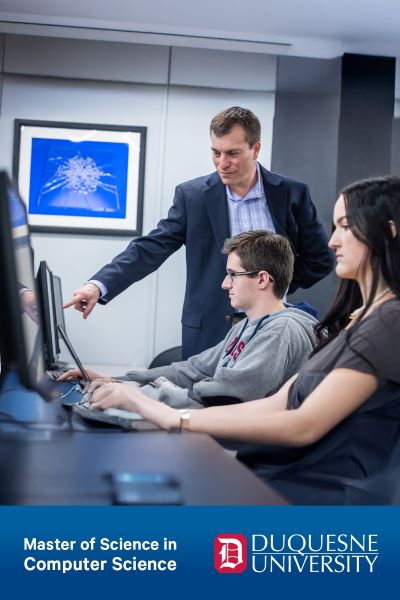Advancing Pittsburgh’s Computer Science Landscape: Duquesne’s MSCS Program
Submitted by Duquesne University
 Pittsburgh has long been a hub for innovation, with its tech scene flourishing alongside its legacy in robotics, AI, and cybersecurity. Home to leading institutions and a thriving startup ecosystem, the city continues to attract top talent and groundbreaking research in computer science. As demand for specialized expertise grows, Duquesne University’s Master of Science in Computer Science (MSCS) program is equipping professionals to lead the next wave of technological advancements, preparing them for anything the future holds.
Pittsburgh has long been a hub for innovation, with its tech scene flourishing alongside its legacy in robotics, AI, and cybersecurity. Home to leading institutions and a thriving startup ecosystem, the city continues to attract top talent and groundbreaking research in computer science. As demand for specialized expertise grows, Duquesne University’s Master of Science in Computer Science (MSCS) program is equipping professionals to lead the next wave of technological advancements, preparing them for anything the future holds.
Faculty Expertise Driving Innovation
A key factor in Duquesne’s growing impact on Pittsburgh’s tech landscape is its dynamic faculty, including Dr. Raffaele Romagnoli, a research scientist and instructor whose expertise in control systems, secure autonomy, and AI-driven cybersecurity is shaping the program’s vision for the future.
Romagnoli brings a fresh perspective to the program, expanding its research into advanced cybersecurity techniques. “One recent project I’ve worked on is called software regeneration, where we proactively defend systems against cyber-attacks by periodically rebooting their runtime software—while they’re still operating,” he explains. This cutting-edge approach has real-world applications, from securing autonomous vehicles to strengthening manufacturing systems through AI-powered network control.
His work at Duquesne also focuses on a crucial challenge in machine learning: guaranteeing AI safety and security. “We know AI can accomplish incredible things, but ensuring reliability in the face of cyber threats is the real challenge. Through interdisciplinary collaboration with fields like mathematics and computer science, we’re developing techniques that ensure AI remains secure while interacting with the physical world.”
A Program Built for Working Professionals
At the heart of Duquesne’s MSCS program is Dr. Donald Simon, Director of the program and associate professor. With over 35 years of experience in the field, Simon has shaped a curriculum that prepares students for the complexities of AI, cybersecurity, and data science.
“Our Master’s program goes into greater depth in computer science topics,” Simon explains. “We assume that students already have a foundation—about the equivalent of a minor in computer science—and we build on that with specialized courses in machine learning, natural language processing, databases, network security, and AI.”
Designed with flexibility in mind, Duquesne’s MSCS program caters to working professionals by offering evening courses and adjustable pacing. “We've had students complete the program in as little as a year and a half, while others—especially those juggling work—spread it out over five years,” says Simon. “We want students to succeed at a pace that works for them, helping them achieve bigger goals in their careers.”
Research & Industry Impact
While the MSCS program is a non-thesis option, research remains an integral part of the experience. Simon emphasizes the importance of faculty-driven research, noting that Romagnoli’s work has drawn significant student engagement. “He’s amazing. His work is thoughtful and incredibly relevant, and he’s attracted many students who want research experience.”
Duquesne MSCS graduates enter Pittsburgh’s expanding tech industry ready to lead in fields like software engineering, system analysis, cybersecurity, and AI-driven applications. Whether developing secure AI models, safeguarding healthcare data, or pioneering autonomous systems, graduates leave the program prepared and ready to make an impact wherever they go.
Seats Still Available for Fall 2025 Start Start your journey today! Learn more about Duquesne’s Master of Science in Computer Science non-thesis program at duq.edu/mscs. No GRE required.